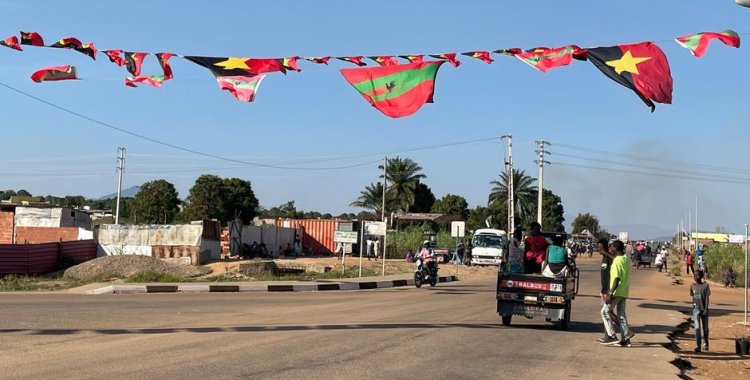According to the deputy attorney general, Mota Liz, the PGR has been monitoring the country in relation to the practice of certain crimes, especially at this stage of the electoral campaign, and the "theft of flags and the burning of propaganda material" by the parties lead the events.
"In addition to other crimes that have been deserving a prompt response from crime prevention and combat bodies, from the country's judicial institutions, giving priority here, due to the nature of these crimes and the nature of their sanctions, to summary judgment", said Mota Liz, in Luanda.
"The response for penalties to fulfill their preventive function, at the general and special level, the response must be swift, because what is wanted in the end is order, stability in the exercise of the vote to guarantee that the elections are fair, free and transparent", he pointed out.
The fifth general elections in Angola's political history are scheduled for August 24, 2022 and the electoral campaign of the eight political formations approved for scrutiny is currently taking place.
In the electoral campaign, which began on 24 July and lasted until 22 August, some political groups complained of alleged acts of political intolerance, especially disputes between militants from opposing parties over the placement of flags in certain locations.
A group of young motorcyclists burned, before the beginning of the electoral campaign, in Luanda, propaganda material from the Popular Movement for the Liberation of Angola (MPLA), for alleged failure of the latter to pay amounts to participate in a march in support of the party's president, which has already demarcated itself from the acts.
The deputy attorney general, who was speaking this Tuesday at the opening of a training cycle for magistrates on electoral civic education, promoted in partnership with the National Electoral Commission (CNE), said that the body "is at the disposal of the CNE " to assist in electoral civic education work.
"Since we will be, at the same time, raising the legal conscience of the population and expressing that we will be attentive to illicit practices that may reflect electoral crimes", he stressed.
Because at the end of it all, he stressed: "We want orderly, peaceful elections, and that our rule of law is increasingly consolidated, that our democracy gains strength that in the future passes with normality and that society is healthy in the field of democracy ".
"In a moment of political euphoria, ignorance or disrespect for the civic rules of coexistence can lead to actions of accountability of various kinds, including criminal liability, hence the theme of electoral crimes has also been included in this training cycle", stressed.
The deputy attorney general considered that magistrates have "an important role in raising the population's legal awareness, noting that the Public Ministry also appears to prevent crime, educating people about what they can or cannot do".
"What are their duties and if they commit them, the Public Prosecutor's Office must be attentive and each Public Prosecutor's magistrate must have electoral crime as a priority in his action at this stage, for example", he pointed out.
"Which are crimes that he would call seasonal, as they occur, fundamentally, at this time, and their prevention is a key element to avoid subversion of order and abnormality in the exercise of elections", he defended.
The training cycle brings together, in Luanda, magistrates from the capital and the provinces of Cabinda and Bengo to train trainers who must replicate the theme in the different provinces of the country.
The president of the CNE, Manuel Pereira da Silva, highlighted the importance of this training cycle, as part of the electoral civic education program leading to the general elections on 24 August.
"Today we are carrying out this training act which essentially aims to transmit knowledge to magistrates, citizens, public and private entities, parties and coalitions on the content of the electoral civic education campaign", he stressed.
He also highlighted the partnership between the CNE and the PGR, "with the creation of a nucleus of trainers for prosecutors in the near future, as well as stimulating the need to respect democratic legality".
"Because electoral agents owe obedience to the Constitution and the law, hence the reason for our appeal to voters, who, after exercising their right to vote, must immediately return to their homes, under penalty of violating the law and there Your Excellencies will have to enforce the law," he further urged.







